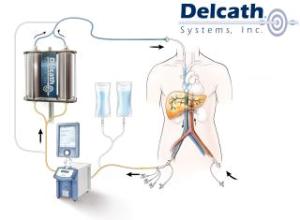
Delcath Systems Inc.’s (NSDQ:DCTH) Chemosat organ-targeting chemotherapy system extended the lives of terminal eye cancer patients by several months without disease progression, researchers said.
Melanoma of the eye often spreads to the liver, generally killing a patient in 1 to 2 months, according to a press release. Patients who received targeted treatment to saturate the liver lived an average of 8.1 months, compared to 1.6 months for patients receiving the best alternative care.
"This is the first treatment to show a clinical benefit in patients with liver metastases from ocular melanoma," Dr. Jampes Pingpank, who presented the data at the European CanCer Organization meeting in Stockholm, Sweden, said in prepared remarks. "Most patients retain 80% or more of their daily functional status, and return to full performance once therapy is completed."
Check out our interview with Delcath president & CEO Eamonn Hobbs.
The Chemosat device uses a system of tubes to localize the delivery of toxic chemotherapy agents by isolating the targeted organ — in this case, the liver — from the rest of the body’s bloodstream.
Isolating the drug allows physicians to use doses several times higher than current standards, and allows physicians to follow up a focused dose of chemo to the liver with a systemic dose to target cancerous tissue throughout the body.
The Phase III randomized trial took place in nine U.S. clinics including 93 patients. As the benefit of Chemosat therapy become more apparent, patients were allowed to cross over from the control arm to get the experimental treatment.
Chemosat won CE Mark approval in the European Union for treatment of liver cancer in April, Hobbs told MassDevice in June, but the device has suffered some regulatory hiccups on the way to FDA clearance.

